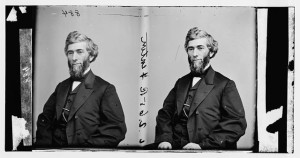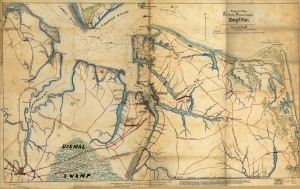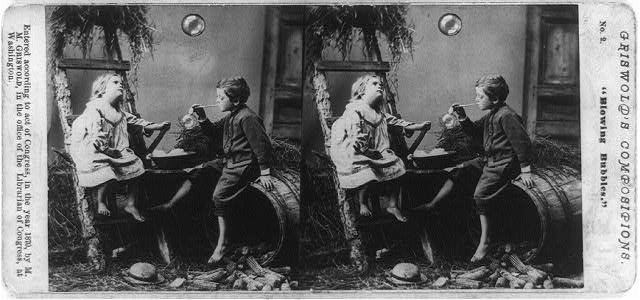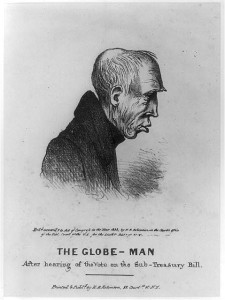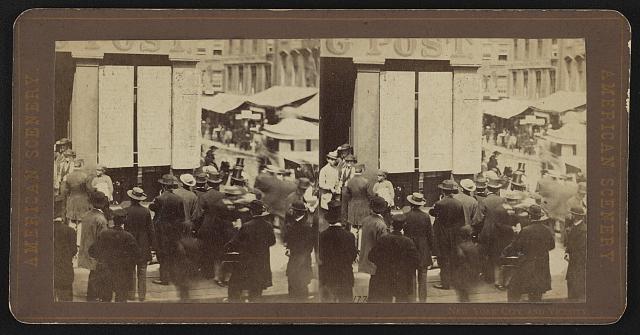150 years ago today the United States House of Representatives approved an amendment to the U.S. Constitution abolishing slavery throughout the United States; the Senate had earlier voted in favor of the proposal. Although three-fourths of the states would have to concur for the amendment to take effect, the federal government had approved a big change to the supreme law of the land.
From the Richmond Daily Dispatch February 6, 1865:
Abolition of slavery by the United States Congress.
It will be seen by our extracts from Northern journals that the Yankee Congress have passed an amendment to the Constitution abolishing slavery throughout the United States, which, in their acceptation of that term, means also the Confederate States. Before this amendment can become a law of the United States proper, it must be ratified by the Legislatures of two-thirds of all the States, including the States of the Confederacy, or by conventions of two-thirds of all. The Yankees have twenty-eight States, all of which, their papers say, will ratify the amendment, thus giving it the ratification of the necessary two- thirds. Whether the law shall ever be carried into effect as regards these Confederate States remains to be decided by the sword.
From the same issue:
Passage of the bill abolishing slavery in the United States–Scenes in Congress — cannon firing and Bell ringing in Yankeedom.

“an epoch in the history of the country” NY Times 2-1-1865
The Yankees have performed another grand Chinese feat. They have amended the Constitution so that it will do what their armies cannot — abolish slavery.–This is followed by great edicts from the abolition mandarins, and a grand flourish of banners and beating of tom- toms, which is to convince the Confederate States that slavery is abolished forever in their limits, and that the “man and brother” is hereafter to have a box seat. The remarkable and rather laughable scene took place in their House of Representatives on the 31st of January, and under the supervision of the half- brother of the moon — Abraham Lincoln. The Washington correspondent of the New York Herald thus describes the event:
A large number of prominent politicians, from different sections of the country, wandered around the cloak room, which seemed to indicate that the floor was free to everybody. State officials and members of Congress, Senators, Cabinet officials and judges, all mingled together, manifesting a deep interest in the event of the hour. There was Postmaster Dennison, with his straight form, long locks, tinged with gray, moving about with an apparently light heart. There was the Secretary of Finance, Mr. Fessenden, wearing an anxious face, and looking as though a mighty weight rested upon his shoulders. Beside him sat Chief Justice Chase, with a countenance full of hope, apparently unconcerned in regard to the events of the hour, but in reality as deeply interested as any person present. Around this locality were gathered numerous public men of note, as well as many yet unknown to fame, forming an interesting group.
The Republican side of the House appeared somewhat agitated. Mr. Ashley, of Ohio, being the person recognized as the leader and mouth-piece of the party on this question, groups of members were constantly gathering about his seat.-… Mr. Ashley finally yielded, and consented that the vote should be taken at half past 3, or postponed half an hour. This appeared to arouse the anger of many Republicans, and an interesting group gathered around Mr. Ashley’s seat. There was Thad. Stevens, got up in full fighting trim from his waist up, shaking his finger at Mr. Ashley for giving way and reading him a lecture. Stevens’s face looked fire, while Ashley’s was as red as a fresh cut of beef. Other members cried, “Mr. Speaker, let us have the vote,” and were determined, if possible, to have a vote. The excited Republicans finally yielded, Stevens taking his seat, but evidently with no good grace.
On the Democratic side there was considerable commotion. …
[parliamentary maneuvers] … Then came the vote on the final passage. Perfect silence, for the first time, reigned. The response of every member was watched, and as one by one the Democrats changed front, there was an expression of joy on the Republican side. Boldly, and like men fully realizing the important step, did Ganson, Radford, Nelson, Steele, Rollins, Yeaman, English and others respond to their names. It was no faint whisper. They responded like men who had weighed carefully the subject, taken their position after mature deliberation, and were ready to take the consequences. It was an important step. In taking it, and responding in the affirmative, however, they only did that which many others on the Democratic side wanted to do, but had not the courage, the heart, to say aye.
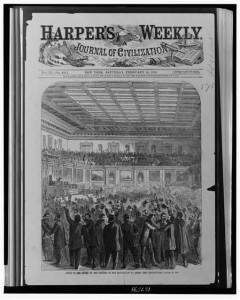
“with rapturous kissing” scene in the House after passage
The roll was concluded. The honored names were all recorded, hereafter to be handed down in company with those who first recorded their names for that noble instrument. Long before it was announced, the expression of the faces of those on the Republican side showed too plainly the result, and that their joy was only being pent up, ready to burst forth the moment that the result was announced. The sharp tone of the Speaker’s voice was soon heard announcing the vote. In a louder, deeper and heavier tone than usual with him, Speaker Colfax announced– “Having received a two-third vote, the amendment has passed.”
Then came a wild scene on the floor of the House. Republican members waved their hats and cheered, the galleries took up the cry, handkerchiefs waved in the air, cheers echoed through the halls, and all dignity of the occasion seemed to be forgotten. Members were dancing, pulling each other around and performing all manner of antics. Among the most amusing was the scene between Mr. Brandegee and Mr. Spaulding. They went through shaking of hands, hugging each other, and other wild demonstrations, finally closing up with rapturous kissing. …
The event was “hailed with joy all over the North,” according to the Herald, which says:
Salutes in honor of the event were fired in various cities yesterday. Governor Fenton sent a message into both Houses of our Legislature, recommending immediate concurrence on their part, and a joint resolution was introduced in both the Senate and the Assembly, which, under the rules, had to lie over for one day. Free Maryland has been the first to ratify the action of Congress. Governor Bradford, of that State, yesterday morning announced to its Legislature the fact of the adoption of the resolution in Congress, and the House of Delegates immediately took it up and concurred by a vote of fifty-three to twenty-three. Governor Andrew, of Massachusetts, has directed the firing of a salute of one hundred guns, and recommended the ringing of the church bells for one hour. …
President Lincoln provided a lawyerly review in response to a serenade the next day. From The Papers And Writings Of Abraham Lincoln, Volume Seven:
CONSTITUTIONAL AMENDMENT FOR THE ABOLISHING OF SLAVERY
PASSAGE THROUGH CONGRESS OF THE CONSTITUTIONAL AMENDMENT FOR THE ABOLISHING OF SLAVERY
RESPONSE TO A SERENADE, JANUARY 31 [February 1], 1865.
He supposed the passage through Congress of the Constitutional amendment for the abolishing of slavery throughout the United States was the occasion to which he was indebted for the honor of this call.
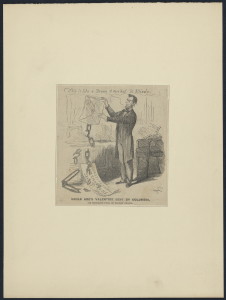
Uncle Abe’s Valentine (Library of Congress, Rare Book and Special Collections Division, Alfred Whital Stern Collection of Lincolniana.)
The occasion was one of congratulation to the country, and to the whole world. But there is a task yet before us—to go forward and consummate by the votes of the States that which Congress so nobly began yesterday. He had the honor to inform those present that Illinois had already done the work. Maryland was about half through, but he felt proud that Illinois was a little ahead.
He thought this measure was a very fitting if not an indispensable adjunct to the winding up of the great difficulty. He wished the reunion of all the States perfected, and so effected as to remove all causes of disturbance in the future; and, to attain this end, it was necessary that the original disturbing cause should, if possible, be rooted out. He thought all would bear him witness that he had never shirked from doing all that he could to eradicate slavery, by issuing an Emancipation Proclamation. But that proclamation falls short of what the amendment will be when fully consummated. A question might be raised whether the proclamation was legally valid. It might be added, that it only aided those who came into our lines, and that it was inoperative as to those who did not give themselves up; or that it would have no effect upon the children of the slaves born hereafter; in fact, it would be urged that it did not meet the evil. But this amendment is a king’s cure for all evils. It winds the whole thing up. He would repeat, that it was the fitting if not the indispensable adjunct to the consummation of the great game we are playing. He could not but congratulate all present—himself, the country, and the whole world upon this great moral victory.

